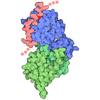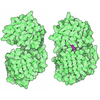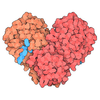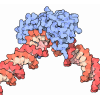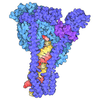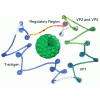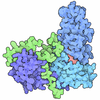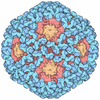[English] 日本語
 Yorodumi
Yorodumi- PDB-7jtp: Crystal structure of Protac MS67 in complex with the WD repeat-co... -
+ Open data
Open data
- Basic information
Basic information
| Entry | Database: PDB / ID: 7jtp | ||||||
|---|---|---|---|---|---|---|---|
| Title | Crystal structure of Protac MS67 in complex with the WD repeat-containing protein 5 and pVHL:ElonginC:ElonginB | ||||||
 Components Components |
| ||||||
 Keywords Keywords | PROTEIN BINDING / Protac / protein degradation / ubiquitination | ||||||
| Function / homology |  Function and homology information Function and homology informationregulation of cellular response to hypoxia / histone H3Q5ser reader activity / histone H3K4me1 reader activity / negative regulation of receptor signaling pathway via JAK-STAT / RHOBTB3 ATPase cycle / Epigenetic regulation of gene expression by MLL3 and MLL4 complexes / MLL3/4 complex / transcription elongation factor activity / Set1C/COMPASS complex / MLL1/2 complex ...regulation of cellular response to hypoxia / histone H3Q5ser reader activity / histone H3K4me1 reader activity / negative regulation of receptor signaling pathway via JAK-STAT / RHOBTB3 ATPase cycle / Epigenetic regulation of gene expression by MLL3 and MLL4 complexes / MLL3/4 complex / transcription elongation factor activity / Set1C/COMPASS complex / MLL1/2 complex / ATAC complex / target-directed miRNA degradation / NSL complex / elongin complex / histone H3K4 methyltransferase activity / Replication of the SARS-CoV-1 genome / Cardiogenesis / VCB complex / Cul5-RING ubiquitin ligase complex / intracellular membraneless organelle / Cul2-RING ubiquitin ligase complex / Formation of WDR5-containing histone-modifying complexes / SUMOylation of ubiquitinylation proteins / histone methyltransferase complex / regulation of cell division / MLL1 complex / negative regulation of transcription elongation by RNA polymerase II / regulation of embryonic development / Pausing and recovery of Tat-mediated HIV elongation / Tat-mediated HIV elongation arrest and recovery / histone acetyltransferase complex / HIV elongation arrest and recovery / Pausing and recovery of HIV elongation / negative regulation of signal transduction / Tat-mediated elongation of the HIV-1 transcript / Formation of HIV-1 elongation complex containing HIV-1 Tat / ubiquitin-like ligase-substrate adaptor activity / Formation of HIV elongation complex in the absence of HIV Tat / RNA Polymerase II Transcription Elongation / Formation of RNA Pol II elongation complex / negative regulation of TORC1 signaling / RNA Polymerase II Pre-transcription Events / positive regulation of gluconeogenesis / transcription initiation-coupled chromatin remodeling / protein serine/threonine kinase binding / negative regulation of autophagy / transcription corepressor binding / gluconeogenesis / skeletal system development / TP53 Regulates Transcription of DNA Repair Genes / positive regulation of cell differentiation / transcription initiation at RNA polymerase II promoter / transcription elongation by RNA polymerase II / Vif-mediated degradation of APOBEC3G / RUNX1 regulates genes involved in megakaryocyte differentiation and platelet function / Inactivation of CSF3 (G-CSF) signaling / Oxygen-dependent proline hydroxylation of Hypoxia-inducible Factor Alpha / Evasion by RSV of host interferon responses / PKMTs methylate histone lysines / Regulation of expression of SLITs and ROBOs / Activation of anterior HOX genes in hindbrain development during early embryogenesis / RMTs methylate histone arginines / cell morphogenesis / ubiquitin-protein transferase activity / mitotic spindle / transcription corepressor activity / Antigen processing: Ubiquitination & Proteasome degradation / positive regulation of proteasomal ubiquitin-dependent protein catabolic process / HATs acetylate histones / Neddylation / microtubule cytoskeleton / MLL4 and MLL3 complexes regulate expression of PPARG target genes in adipogenesis and hepatic steatosis / regulation of gene expression / protein-containing complex assembly / Replication of the SARS-CoV-2 genome / ubiquitin-dependent protein catabolic process / histone binding / protein-macromolecule adaptor activity / cellular response to hypoxia / DNA-binding transcription factor binding / amyloid fibril formation / molecular adaptor activity / proteasome-mediated ubiquitin-dependent protein catabolic process / regulation of cell cycle / protein stabilization / cilium / protein ubiquitination / negative regulation of cell population proliferation / negative regulation of gene expression / ubiquitin protein ligase binding / regulation of DNA-templated transcription / regulation of transcription by RNA polymerase II / negative regulation of apoptotic process / positive regulation of DNA-templated transcription / enzyme binding / endoplasmic reticulum / negative regulation of transcription by RNA polymerase II / mitochondrion / proteolysis / nucleoplasm Similarity search - Function | ||||||
| Biological species |  Homo sapiens (human) Homo sapiens (human) | ||||||
| Method |  X-RAY DIFFRACTION / X-RAY DIFFRACTION /  SYNCHROTRON / SYNCHROTRON /  MOLECULAR REPLACEMENT / Resolution: 2.12 Å MOLECULAR REPLACEMENT / Resolution: 2.12 Å | ||||||
 Authors Authors | Kottur, J. / Jain, R. / Aggarwal, A.K. | ||||||
 Citation Citation |  Journal: Sci Transl Med / Year: 2021 Journal: Sci Transl Med / Year: 2021Title: A selective WDR5 degrader inhibits acute myeloid leukemia in patient-derived mouse models. Authors: Yu, X. / Li, D. / Kottur, J. / Shen, Y. / Kim, H.S. / Park, K.S. / Tsai, Y.H. / Gong, W. / Wang, J. / Suzuki, K. / Parker, J. / Herring, L. / Kaniskan, H.U. / Cai, L. / Jain, R. / Liu, J. / ...Authors: Yu, X. / Li, D. / Kottur, J. / Shen, Y. / Kim, H.S. / Park, K.S. / Tsai, Y.H. / Gong, W. / Wang, J. / Suzuki, K. / Parker, J. / Herring, L. / Kaniskan, H.U. / Cai, L. / Jain, R. / Liu, J. / Aggarwal, A.K. / Wang, G.G. / Jin, J. | ||||||
| History |
|
- Structure visualization
Structure visualization
| Structure viewer | Molecule:  Molmil Molmil Jmol/JSmol Jmol/JSmol |
|---|
- Downloads & links
Downloads & links
- Download
Download
| PDBx/mmCIF format |  7jtp.cif.gz 7jtp.cif.gz | 156.3 KB | Display |  PDBx/mmCIF format PDBx/mmCIF format |
|---|---|---|---|---|
| PDB format |  pdb7jtp.ent.gz pdb7jtp.ent.gz | 116.7 KB | Display |  PDB format PDB format |
| PDBx/mmJSON format |  7jtp.json.gz 7jtp.json.gz | Tree view |  PDBx/mmJSON format PDBx/mmJSON format | |
| Others |  Other downloads Other downloads |
-Validation report
| Summary document |  7jtp_validation.pdf.gz 7jtp_validation.pdf.gz | 720.4 KB | Display |  wwPDB validaton report wwPDB validaton report |
|---|---|---|---|---|
| Full document |  7jtp_full_validation.pdf.gz 7jtp_full_validation.pdf.gz | 725.5 KB | Display | |
| Data in XML |  7jtp_validation.xml.gz 7jtp_validation.xml.gz | 28.8 KB | Display | |
| Data in CIF |  7jtp_validation.cif.gz 7jtp_validation.cif.gz | 43 KB | Display | |
| Arichive directory |  https://data.pdbj.org/pub/pdb/validation_reports/jt/7jtp https://data.pdbj.org/pub/pdb/validation_reports/jt/7jtp ftp://data.pdbj.org/pub/pdb/validation_reports/jt/7jtp ftp://data.pdbj.org/pub/pdb/validation_reports/jt/7jtp | HTTPS FTP |
-Related structure data
| Related structure data |  7jtoC  1vcbS  2gnqS S: Starting model for refinement C: citing same article ( |
|---|---|
| Similar structure data |
- Links
Links
- Assembly
Assembly
| Deposited unit | 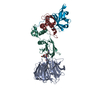
| ||||||||
|---|---|---|---|---|---|---|---|---|---|
| 1 |
| ||||||||
| Unit cell |
|
- Components
Components
-Protein , 4 types, 4 molecules JKLA
| #1: Protein | Mass: 11748.406 Da / Num. of mol.: 1 Source method: isolated from a genetically manipulated source Source: (gene. exp.)  Homo sapiens (human) / Gene: ELOB, TCEB2 / Plasmid: pCDF Duet / Production host: Homo sapiens (human) / Gene: ELOB, TCEB2 / Plasmid: pCDF Duet / Production host:  |
|---|---|
| #2: Protein | Mass: 10974.616 Da / Num. of mol.: 1 Source method: isolated from a genetically manipulated source Source: (gene. exp.)  Homo sapiens (human) / Gene: ELOC, TCEB1 / Plasmid: pCDF Duet / Production host: Homo sapiens (human) / Gene: ELOC, TCEB1 / Plasmid: pCDF Duet / Production host:  |
| #3: Protein | Mass: 18702.291 Da / Num. of mol.: 1 Source method: isolated from a genetically manipulated source Source: (gene. exp.)  Homo sapiens (human) / Gene: VHL / Production host: Homo sapiens (human) / Gene: VHL / Production host:  |
| #4: Protein | Mass: 34037.641 Da / Num. of mol.: 1 Source method: isolated from a genetically manipulated source Source: (gene. exp.)  Homo sapiens (human) / Gene: WDR5, BIG3 / Plasmid: pET28 / Production host: Homo sapiens (human) / Gene: WDR5, BIG3 / Plasmid: pET28 / Production host:  |
-Non-polymers , 3 types, 443 molecules 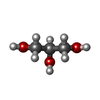
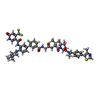



| #5: Chemical | ChemComp-GOL / |
|---|---|
| #6: Chemical | ChemComp-X6M / |
| #7: Water | ChemComp-HOH / |
-Details
| Has ligand of interest | Y |
|---|
-Experimental details
-Experiment
| Experiment | Method:  X-RAY DIFFRACTION / Number of used crystals: 1 X-RAY DIFFRACTION / Number of used crystals: 1 |
|---|
- Sample preparation
Sample preparation
| Crystal | Density Matthews: 2.66 Å3/Da / Density % sol: 53.78 % |
|---|---|
| Crystal grow | Temperature: 293.15 K / Method: vapor diffusion, sitting drop / pH: 8.5 / Details: 0.1 M Tris, pH 8.5, 30% PEG300 / PH range: 8.5 |
-Data collection
| Diffraction | Mean temperature: 100 K / Serial crystal experiment: N | ||||||||||||||||||||||||||||||||||||||||||||||||||||||||||||||||||||||||||||||||||||||||||||||||||||||||||||||
|---|---|---|---|---|---|---|---|---|---|---|---|---|---|---|---|---|---|---|---|---|---|---|---|---|---|---|---|---|---|---|---|---|---|---|---|---|---|---|---|---|---|---|---|---|---|---|---|---|---|---|---|---|---|---|---|---|---|---|---|---|---|---|---|---|---|---|---|---|---|---|---|---|---|---|---|---|---|---|---|---|---|---|---|---|---|---|---|---|---|---|---|---|---|---|---|---|---|---|---|---|---|---|---|---|---|---|---|---|---|---|---|
| Diffraction source | Source:  SYNCHROTRON / Site: SYNCHROTRON / Site:  NSLS-II NSLS-II  / Beamline: 17-ID-2 / Wavelength: 0.97936 Å / Beamline: 17-ID-2 / Wavelength: 0.97936 Å | ||||||||||||||||||||||||||||||||||||||||||||||||||||||||||||||||||||||||||||||||||||||||||||||||||||||||||||||
| Detector | Type: DECTRIS EIGER X 16M / Detector: PIXEL / Date: Jun 17, 2019 | ||||||||||||||||||||||||||||||||||||||||||||||||||||||||||||||||||||||||||||||||||||||||||||||||||||||||||||||
| Radiation | Monochromator: double crystal Si(111) / Protocol: SINGLE WAVELENGTH / Monochromatic (M) / Laue (L): M / Scattering type: x-ray | ||||||||||||||||||||||||||||||||||||||||||||||||||||||||||||||||||||||||||||||||||||||||||||||||||||||||||||||
| Radiation wavelength | Wavelength: 0.97936 Å / Relative weight: 1 | ||||||||||||||||||||||||||||||||||||||||||||||||||||||||||||||||||||||||||||||||||||||||||||||||||||||||||||||
| Reflection | Resolution: 2.05→78.033 Å / Num. all: 46516 / Num. obs: 46516 / % possible obs: 100 % / Redundancy: 7.1 % / Biso Wilson estimate: 35.02 Å2 / Rpim(I) all: 0.038 / Rrim(I) all: 0.102 / Rsym value: 0.095 / Net I/av σ(I): 4.7 / Net I/σ(I): 11.7 / Num. measured all: 331442 | ||||||||||||||||||||||||||||||||||||||||||||||||||||||||||||||||||||||||||||||||||||||||||||||||||||||||||||||
| Reflection shell | Diffraction-ID: 1 / % possible all: 100
|
- Processing
Processing
| Software |
| ||||||||||||||||||||||||||||||||||||||||||||||||||||||||||||||||||||||||||||||||||||||||||
|---|---|---|---|---|---|---|---|---|---|---|---|---|---|---|---|---|---|---|---|---|---|---|---|---|---|---|---|---|---|---|---|---|---|---|---|---|---|---|---|---|---|---|---|---|---|---|---|---|---|---|---|---|---|---|---|---|---|---|---|---|---|---|---|---|---|---|---|---|---|---|---|---|---|---|---|---|---|---|---|---|---|---|---|---|---|---|---|---|---|---|---|
| Refinement | Method to determine structure:  MOLECULAR REPLACEMENT MOLECULAR REPLACEMENTStarting model: PDB entries 2GNQ & 1VCB Resolution: 2.12→57.089 Å / SU ML: 0.23 / Cross valid method: THROUGHOUT / σ(F): 1.34 / Phase error: 22.85 / Stereochemistry target values: ML
| ||||||||||||||||||||||||||||||||||||||||||||||||||||||||||||||||||||||||||||||||||||||||||
| Solvent computation | Shrinkage radii: 0.9 Å / VDW probe radii: 1.11 Å / Solvent model: FLAT BULK SOLVENT MODEL | ||||||||||||||||||||||||||||||||||||||||||||||||||||||||||||||||||||||||||||||||||||||||||
| Displacement parameters | Biso max: 93.47 Å2 / Biso mean: 40.2234 Å2 / Biso min: 16.96 Å2 | ||||||||||||||||||||||||||||||||||||||||||||||||||||||||||||||||||||||||||||||||||||||||||
| Refinement step | Cycle: final / Resolution: 2.12→57.089 Å
| ||||||||||||||||||||||||||||||||||||||||||||||||||||||||||||||||||||||||||||||||||||||||||
| LS refinement shell | Refine-ID: X-RAY DIFFRACTION / Rfactor Rfree error: 0 / % reflection obs: 100 %
|
 Movie
Movie Controller
Controller


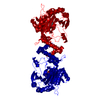
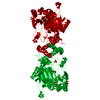

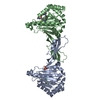
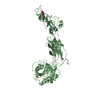
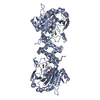
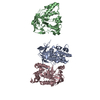
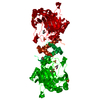
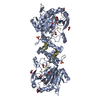

 PDBj
PDBj